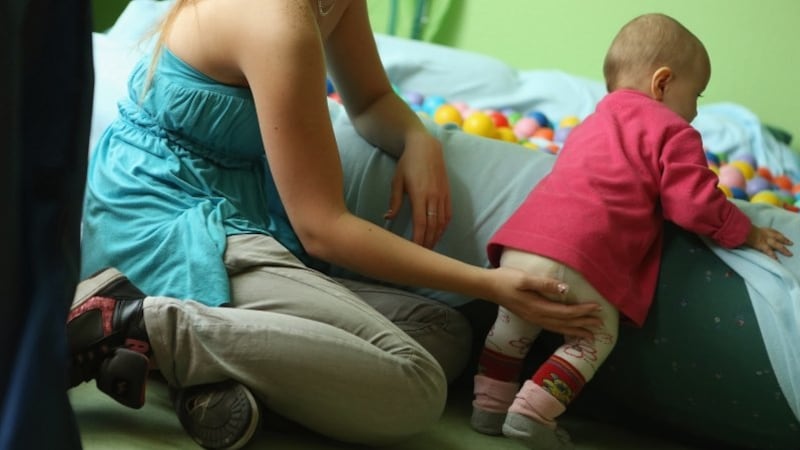It appears that it’s open season on single mothers again.
Granted, open season is called on single mothers a few times a year and can be spurred by anything from a politician trying to punt a question about gun control to polling data showing women are frequently breadwinners for their families, so this isn’t unusual. But this round is particularly aggressive, with George Will actually blaming single mothers for Detroit’s bankruptcy, Bill O’Reilly using the specter of single motherhood to distract from the Trayvon Martin case (even though George Zimmerman did not check Martin’s parentage before choosing to gun down the unarmed young man), and even CNN’s Don Lemon going on a moralizing scold that assumes that women become single mothers for no other reason than to thumb their nose at propriety.
In these arguments, the underlying racial anxieties that often accompany hand-wringing over growing rates of single motherhood weren’t hidden at all, creating the distinct impression that these men view black women as a singularly immoral class of human beings who need to be scolded until they shape up—even though decades of conservative freak-outs about single motherhood have only resulted in the rates going up and not down. It is true that black women are more likely than other groups of women to be unmarried when they give birth, but it’s hardly a phenomenon limited to black women, nor does it mean what so many of these commentators seem to think—which is that fathers are completely out of the picture. As Stacia L. Brown at Salon said in her rebuttal to Lemon:
"It’s just as irresponsible an anecdote as his claim that 'born out-of-wedlock' means 'absent fathers.' In fact, there have been numerous studies disproving this popular claim. To be fair, maybe Lemon didn’t feel the need to interrogate this fallacy, since it’s such an easily regurgitated go-to position."
Brown put her finger on the biggest problem with the routine media panic about single mothers: it’s all stale talking points and very little actual analysis and understanding. Single mothers are just a media bogeyman to be dragged out and blamed for all manner of social ills—which serves to distract from our actual social problems. Indeed, a sober-minded appraisal of the realities of single motherhood suggests not that rising rates of single motherhood are the cause of certain social ills but in fact the result—often of the very problems the commentators are trying to distract their audiences from wondering about.
To begin with, there’s the utter sloppiness in media definitions of what constitutes a “single mother.” Commentators like Lemon casually conflate it with that cringeworthy phrase “out-of-wedlock birth” all the time, but the realities are much more complex. As Stacia Brown points out, not having a ring on your finger does not necessarily equal single as far as your community and family are concerned. Plenty of unmarried women were living with the father of their child when they gave birth and intend to continue living with him. The CDC estimates that 23 percent of babies have parents who are together but aren’t married. Many of them go on to marry, complicating the neat division between “married” and “single” mothers.
Even conservative researchers whose goal is to try to return America to the days of young marriage have to admit that research shows that single mothers often aren’t, well, single. W. Bradford Wilcox, writing about a report he helped create called Knot Yet, tried to frighten readers by pointing out that parents cohabitating at the time of the birth of the first child are more likely to break up than parents who are married. But even so, his numbers demonstrate that 61 percent of the supposed “single mothers” cohabitating with their partner when they gave birth are still with him five years later. How long do you have to live with and love a man who is helping to raise your children before you stop being a “single mother” in the eyes of worried conservatives?
All this concern over unmarried mothers obscures another important reality: the huge numbers of women who are raising children by themselves but don’t get noticed or counted most of the time as “single mothers,” because they did get married once, but now they are divorced. It’s easy to understand why commentators simply fail to mention the role divorce plays in all this, because divorced women are the ones who tried to follow the rules. They got married, they had kids, they did everything they were supposed to do, but it still didn’t work out. They don’t fit into a neat little narrative of panic about premarital sex, and so even as they constitute a large percentage of single women raising children, divorced women are rarely discussed when we talk about single mothers.
This is a shame, because as much as conservatives like to darkly warn about the links between economic hardship and single motherhood, the fact that break-up of those holy marriages we’re all supposed to make is a major contributor to the financial problems of single mothers. Forty percent of women who are the head of their families live in poverty, and a huge chunk of them had their children in wedlock. When a couple divorces, women take a major financial hit, with researcher Lenore Weitzman estimating that men’s standard of living rises 42 percent after a divorce while women’s falls 73 percent.
The fact of the matter is that single motherhood is associated with poverty and other kinds of problems, and not because wedding ceremonies imbue a family with some kind of magical protection. It’s because of a host of complex reasons that can’t be boiled down into a moral scolding session about the value of marriage. Indeed, one reason that a lot of women are technically single but actually cohabitating on the day they give birth is due to economic pressures beyond their control.
Most young people these days understandably want to be economically stable before getting married, in no small part because they understand that instability can lead to divorce. Unfortunately, because of our growing economic inequality, this stability is becoming ever more elusive for Americans. As Jennifer Silva writes, “While nine out of ten college-educated women wait to have children until after they get married, only six out of ten with a high school degree postpone childbearing until after marriage, which means that the material and symbolic benefits of marriage (e.g., pooled income and assets, less financial risk in making large purchases) accrue to those already born in the top of the income distribution.”
Meanwhile, pregnancies still happen and people still have babies, even if marriage seems like a pipe dream. Unmarried motherhood, in other words, is often the result of poverty and not the cause of it. Getting married doesn’t make you better off so much as better-off people tend to get married more.
There’s no reason to believe that simply putting a ring on it will make the real issues that women face—economic instability, lack of child care, lack of health care—any less pressing. Couples who are currently raising children together without being married, who register as “single mothers” in the data, aren’t going to suddenly get better jobs because they get married. Women who divorce or break up with their children’s father usually have no better option than to get out of their failing relationship.
All this focus on single motherhood distracts from the real issues that are creating problems for children, especially the children who live in the economic circumstances that produce more women labeled “single” regardless of their actual living situation on surveys. More than having a legally recognized husband the moment they give birth, women need health care, child care, equal pay, and a society that pays workers a decent wage instead of constantly shifting more wealth to the top 1 percent. If they have all these things, the rate of marriage at birth will probably go up as a result, but make no mistake, that too will be a symptom and not the cause of a more just society.






